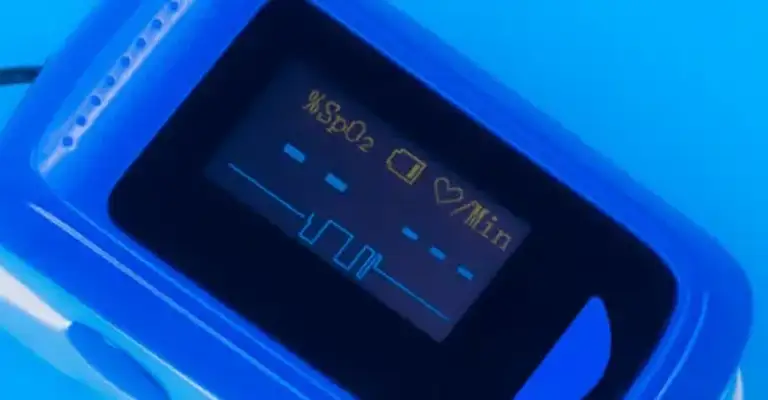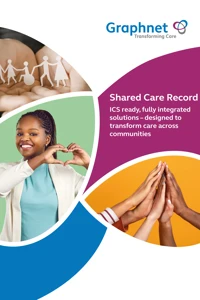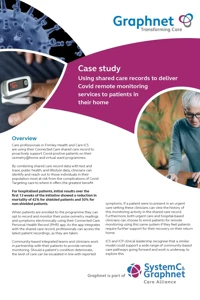Using shared care records to deliver Covid remote monitoring solutions to patients in their home
09 March 2021
Care professionals in Frimley Health and Care ICS are using their Connected Care shared care record to proactively support Covid-positive patients on their oximetry@home and virtual ward programmes.
Connected Care for Covid remote monitoring
By combining shared care record data with test and trace, public health, and lifestyle data, clinicians can identify and reach out to those individuals in their population most at risk from the complications of Covid. Targeting care to where it offers the greatest benefit.
When patients are enrolled to the programme they can opt to record and monitor their pulse oximetry readings and symptoms electronically using their Connected Care Personal Health Record (PHR) app. As the app integrates with the shared care record, professionals can access the latest patient recordings, as they are taken.
Community-based integrated teams and clinicians work in partnership with their patients to provide remote monitoring. Should a patient’s condition deteriorate, the level of care can be escalated in line with reported symptoms. If a patient were to present in an urgent care setting these clinicians can view the history of this monitoring activity in the shared care record. Furthermore, both urgent care and hospital-based clinicians can choose to enrol patients for remote monitoring using this same system if they feel patients require further support for their recovery on their return home.
ICS clinical leadership recognise that a similar model could support a wide range of community-based care pathways going forward and work is underway to explore this.
The rationale behind remote monitoring during Covid
The Connected Care Programme set up a pilot project team in Spring 2020 to support the Slough BAME Project pulse oximetry programme, one of three national pilot sites for enhanced remote monitoring. Slough was an area showing high Covid transmission and infection rates, with a high population density and a high proportion of BAME residents.
Based on findings from these pilots and other clinical research, NHSX and NHS England have established two national Covid remote monitoring programmes, ‘Covid oximetry@home’ in primary and community care and the ‘Virtual ward’ programme in secondary care
In both cases, patients are given a pulse oximeter to monitor their oxygen saturation levels at home. If a patient’s condition deteriorates or they develop silent hypoxia both models of care are designed to ensure that clinical staff can offer the right level of help at the right time.
A marked proportion of patients at home with severe Covid symptoms are not presenting to urgent care settings early enough, so remote monitoring by clinicians can help significantly improve outcomes.
In the case of Frimley ICS, these programmes are being set up using a digital ecosystem supplied by Graphnet: our shared care record, population health management and personal health record.
Benefits of the Connected Care platform
Mark Sellman, programme director for Connected Care and CIO for Frimley ICS commented: “Our Connected Care platform enables us to report accurately on the cohort enrolled on the Oximetry@home pilot service against control groups.”
Findings for the period 11 Nov 2020 to 27 Feb 2021 were:
- In shielded, hospitalised patients, mortality rate reduced from 30% (for those not enrolled) to 17% (for those enrolled). A 42% reduction in mortality.
- In hospitalised patients who are not shielded, mortality rate reduced from 24% (not enrolled) to 12% (enrolled). A 50% reduction in mortality.
- Quantified as lives saved and bed days avoided by comparing against a meaningful control group, 28 lives were saved in the 108 day evaluation period and median lengths of hospital stay reduced from 9 days to 7 days.
Care communities without a shared care record typically rely on a daily list from NHS Digital of patients in their area who have tested positive, with indicators for those who meet the recommended age criteria and/or those considered Clinically Extremely Vulnerable.
Frimley ICS generate a potential candidates list using a combination of shared care record (including past medical histories), test and trace, wider determinants, and lifestyle data to analyse Covid positive and suspected positive patients, identifying those at greatest risk from Covid complications and those in most urgent need of support.
For example, they can target vulnerable people of a particular demographic background, who live alone and those with underlying clinical conditions like Chronic Obstructive Pulmonary Disease, or a high Body Mass Index. Factors that not only put them at higher risk, but if they were to develop complications, likely to impact their convalescence and recovery.
Sharon Boundy, associate director for system transformation at Frimley ICS, explained: “We widened the eligibility criteria from national guidance to cover more of our residents in greatest need. Our pilot results, scaled to this overall community, presents an opportunity for profound impact. We’ve seen over 2,000 people through the service to date”.
Benefits include better identification of those at risk, more efficient targeting of care and resources and the prospect of better outcomes of people – allowing healthier lives to be lived and addressing inequalities in care.
"I had a 45 year old male of BAME background with underlying diabetes whose son developed COVID and, a few days later, my patient developed symptoms and tested positive as well...We enrolled him in the pulse oximetry programme and after day 11 his symptoms suddenly deteriorated from 95% saturations to 80% saturations. He was taken straight into hospital and he had a covid-related pulmonary embolism. Without the pulse oximetry programme, we wouldn't have known he had deteriorated and this has saved the patient's life”
Dr Priya Kumar, Connected Care
How our platform supports remote monitoring solutions
Our population health platform presents care professionals with a potential candidates list and an overview of all patients on their virtual ward. As the platform is integrated with the shared care record, professionals with the appropriate level of access can select a patient from the list and click directly into that patient’s shared care record, providing a more detailed view offering access to information on recent Covid test results, status and full details of symptoms, assessments, and trends of results to help monitor progress.
Subject to the level of support agreed with the patient, a clinician can go through a structured questionnaire to record a day’s assessments directly into the patient’s shared care record. Alternatively, a patient might choose to remotely enter their readings via their PHR app. Clinicians are also able to send messages to their patient via the app, such as a request to increase the frequency of oximetry readings. The system provides automated support - for example, if entries are very different compared to previous recordings, the patient is advised to rest for five minutes and redo. If their readings and symptoms are deteriorating, it provides advice (based on national guidance) on actions the patient should take. The app has several additional features including a summary view from the shared care record.
Next steps
Across the national health and care economy, similar models could be applied in support of many more community-based care pathways.
Graphnet is working with its customers to identify and realise these opportunities. To learn how we can help support your community, or for more information about the Frimley Health Record App, contact us here.
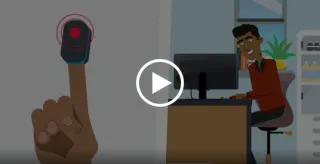
Watch our video to find out more
Findings (11 Nov 2020 to 27 Feb 2021):
- 42% reduction in mortality in shielded, hospitalised patients
- 50% reduction in mortality in hospitalised patients who are not shielded
- 28 lives saved
- Median lengths of hospital stay reduced from 9 days to 7 days
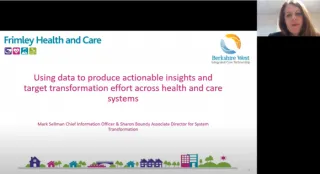
Pulse oximetry programme at Frimley ICS & Berkshire West
Part of a Digital Health Best Practice webinar featuring Sharon Boundy and Mark Sellman from Frimley ICS





